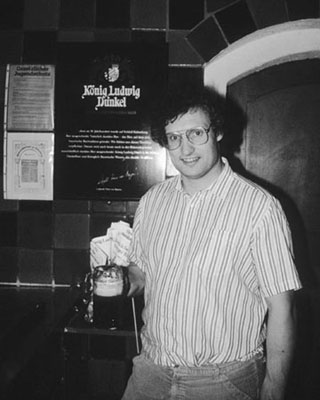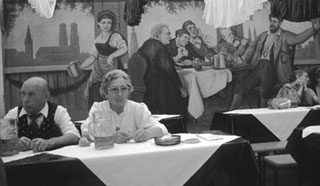Microbrewed Adventures (20 page)

Altbier was the most popular style of beer in the city of Düsseldorf, where it has maintained a tradition for centuries. That evening I delightfully lived my own 19th century. These Altbiers were certainly the most popular styles of the evening. Altbier is difficult to find in other parts of Germany, though bottled versions are sometimes available. A growing number of American and Japanese microbreweries are making true-to-style German Altbier. The Widmer Brothers Brewing Company in Portland, Oregon, was one of the first microbreweries to popularize this style in the United States. Their version is delicious and true to style, yet not quite as bitter as my favorite, Zum Uerige Alt.
Weissbier in Bavaria
Hopfweissbier Brauerei
A
T
10
A.M
.
in Bavaria you are likely to find yourself in the company of others enjoying the traditional late breakfast of Weissbier (wheat beer) and Weisswurst (white sausage of veal). It's a treat any time of day, but uniquely Bavarian when enjoyed before noon.
Whichever you call it, Weizenbier or Weissbier, wheat beer is spectacularly popular in Bavaria. In 1984 this slightly acidic, yeasty, well-carbonated style of beer with its hint of clove and banana flavor accounted for less than 1 percent of German beer drinking. By 1989 it was the second most popular style of beer in Bavaria (pils is first), with a 28 percent share of the beer mar
ket. In 2004 its share was 33 percent, and it continues to grow. Bavarians love their Weizenbier, and they like it
mit Hefe
(with yeast).
I had the privilege and great pleasure of spending several days with Hans Hopf and his family in Miesbach, 30 miles south of Munich in the foothills of the Alps. The relatively small Hopfweissbier Brauerei has been in the Hopf family for three generations and continues to slowly grow to meet the demand for wheat beer. It is unique in that it is one of only a few breweries in Germany that brews exclusively wheat beer.
A morning in the brewery and some enjoyable evenings at local beer gardens gave insight into the German wheat beer phenomenon. Hans explained, “I have problems sometimes with my cask wheat beer because the yeast settles too well and the beer comes out too clear. People prefer yeast in their wheat beer. I tell the managers to roll the kegs a little, but that does not seem to help.” I was astonished to learn that some beer gardens and beer houses offered yeast dispensers, designed like mustard dispensers. “People will put the yeast in their other beers as well. It is a healthy thing to do because of all the vitamins in the beer yeast.”
If you are a brewer and are thinking of culturing yeast sediment from the bottom of a bottle of German wheat beer, though, you'd better think twice. Yes, the yeast sediment is alive and naturally carbonates the beer in the bottle, just as in homebrewed beer. The fact is that most wheat beers are filtered before bottling in order to remove the “powdery” top-fermenting yeast that does not settle to the bottom very well. Wheat beer is then inoculated with a more easily sedimented strain of lager yeast and held at relatively warm temperatures to naturally carbonate in the bottle. While touring the brewery, Hans explained that using a different “bottle yeast” really affects the flavor of the beer significantlyâand for his beer it made a positive difference.

Hans Hopf

Bianca Hopf
In the room beneath the kettle it was very warm. It was there Hans had me sample a small batch of fermenting wort. It was so sour my mouth puckered. “That is 1 percent lactic acidity,” he explained. Because of the natural carbonate hardness of the local water, Hans had been experimenting with naturally acidifying his mashing regime and wort production. High carbonate levels in water will produce pH ranges that prevent the desired extraction of sugars from grains during the mashing process. By fermenting a portion of naturally produced wort with a strain of lactobacillus bacteria, Hans is able to add a portion of soured extract and obtain a better yield from his grains. By adding a portion of soured wort to his main wort during wort boiling, he found he could also control the flavor balance of his Weissbiers and get better flavors out of the hops he uses.
Because of tradition and Germany's beer purity law, the
Reinheitsgebot,
German brewers cannot use industrially made acids to adjust the pH of their mash or wort. Much of Germany's water has been contaminated with man-made nitrates from fertilizers used in agriculture. The water is unfit for brewing, so almost every brewery I visited filtered and purified its water or used deep well water (which often had high carbonate levels).
The Hopfweissbier Brauerei brews wheat beers exclusively, including Dunkel (dark) Weizen, Weizenbock and Weizen Doppelbock. The brewery is family-owned. At the time of my first visit, Bianca, Hans's 13-year-old daughter, had already expressed an interest in attending Weihenstephan University and taking over as brewmaster someday. In 1989, when I left Miesbach, she was wearing an American Homebrewers Association T-shirt
that read, “I brew therefore I am.” I recently checked in with her, and she anticipates taking over general manager responsibilities and running the brewery in 2006.
HANS WEISSBIER
This beer is formulated and brewed in the true German wheat beer tradition. Your brewmaster skills will guide you to the exact temperature conditions in which to manage fermentation of this most delicately wonderful Bavarian wheat beer. The recipe can be found in About the Recipes.
With His Royal Highness
Printz Luitpold von Bayern
H
IS ROYAL HIGHNESS PRINTZ LUITPOLD
of Bavaria would have been the successor to the throne of Bavaria if such things happened today. Instead, Printz Luitpold is a brewer and in 1989 operated two breweries west of Munich: one in Fuerstenfeldbruck and the other at his castle at Kaltenberg. He also has installed dozens of microbreweries and brewpub systems throughout the world in such places as China, Canada, Hungary, Russia and the United States, as well as in Germany.
After my stop at Miesbach I found myself cruising the countryside with His Royal Highness. The level of excitement could be heard in his voice as he announced, “We are preparing for our annual medieval jousting tournaments and Renaissance festival at the castle. You must come to see the preparations after our brewery visits and have some beer, of course.”
We talked of beer, breweries and Germany. Printz Luitpold's royalty made him no less passionate about beer and brewing than the most enthusiastic of beer brewers. Though his two production breweries were rather large scale, they produced beers fit for a king. His passion was obvious. He has the heart and soul of a microbrewer and the spirit of an adventurer.
During our drive, he told me, “There are about 800 private breweries in Germany. Every year there are fewer.” I knew this and felt remorse whenever I hear those dwindling statistics, but the prince explained that it was not all the result of poor business management or lack of marketing. He continued to explain, “On the average every 30 years a brewery goes through a generation change. About 30 breweries each year face a family decision: who will manage the brewery? Sometimes there are family disagreements and often no one in the family is interested in continuing.”
This was the first time I had heard this perspective, one often hidden from the beer drinker's realm.
We arrived in Fuerstenfeldbruck for a beer at the town's beer festival. Never mind the breweryâwe had both seen enough breweries in our
lives. The festival was where the beer and people were! It was where I found myself with the prince. It was mid-afternoon, midweek, and there were thousands of people drinking liter mugs of Luitpold's Hellesbier. The brewery was sponsoring free beer for senior citizens. I looked around to see that virtually everyone there was between the ages of 60 and 100âand many were at the top end of the scale! Everywhere there were both quiet and animated conversations as the oompah band belted out the Bavarian classics hit parade. I looked around at all those wise faces, faces that knew of other times and many more breweries. It occurred to me that, yes, more changes are yet to evolve as Germany joins the European Union.

Printz Luitpold, 1987

Free beer for the elderly

Printz Luitpold and Papazian, 2004
Printz Luitpold's home and brewery, Kaltenberg Castle, is in the quietly picturesque countryside. Here he brews his increasingly popular dark Dunkelbier, some of which is lagered in large, century-old oak barrels. It is also the site of his jousting tournament, an event attracting 200,000 thirsty people.
The media were visiting that day, covering a promotional story about the event. One beer led to another and the prince dressed me in a complete suit of armor for a photo opportunity with him, a fair maiden and, of course, a beer.
Later that day when we parted company, he told me, “If you are interested I can get you a custom-made suit of armor for about $1,500.” So far I have not taken him up on the offer, as it would seriously handicap my drinking style.